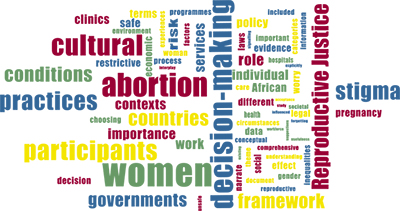
I recently took part in an abortion research e-conference hosted by the London School of Economics from the 8th to the 9th of June 2015. The e-conference focused on three broad themes: abortion care workforce policy, best practices in advertising the availability of abortion services, and a conceptual framework for understanding women’s trajectories to safe or unsafe abortion.
My focus was on the theme of a framework for considering women’s abortion decision-making as it relates to my own PhD work. The framework developed by Coast, Norris, Moore and Freeman (2014) uses data from different countries to document the abortion decision-making process. Abortion decision-making is seen as being influenced by social, cultural, environment, legal and economic factors that interplay with individual needs and circumstances. Participants drew on experiences and evidence from many countries, including Ghana, US, UK, Uruguay, Senegal, Zimbabwe, and Zambia.
All the participants found the framework useful and comprehensive. There were few suggestions made in terms of the framework. These included explicitly including study/work trajectories, women’s own health and the effect the current pregnancy may have on existing children. The importance of information on abortion services and how this may affect decisions was emphasised. Other important aspects of the framework included the role of stigma especially in contexts where there are restrictive laws for example most African countries. The importance of governments in the abortion decision-making process was also emphasised by participants. Governments were seen as playing a big role not only in providing clinics and hospitals that provide abortion and post abortion services but in signalling wider societal acceptance through programmes that look to tackle stigma.
I liked how the framework fits well with the reproductive justice framework where abortion decision-making is not only a matter of a woman choosing whether to have an abortion or not. Abortion decision-making is seen as not happening in a vacuum and Coast et al’s (2014) framework touches on the different contexts which include social, economic, gender, and colonial inequalities that abortion decision-making occurs. Despite this usefulness my main worry, however was that there was a risk of losing the individual woman in the abortion decision. Despite what might appear to be similar circumstances and conditions between two women, the way they narrate and carry out their abortion decision-making can be different. This then means that there was a need to be careful about not placing women in categories and forgetting about the individual. Participants agreed that care needed to be taken so that the individual would not be lost in the conceptual framework.
By: Malvern Tatenda Chiweshe
